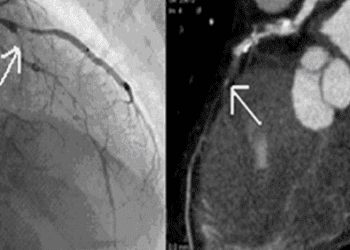Presence of antiphospholipid antibodies found to be an important independent risk factor for myocardial infarction
1. A positive association was found between the antiphospholipid antibody immunoglobulin G and first-time myocardial infarctions in study patients.
2. No relationships were observed between the antiphospholipid antibody immunoglobulin M or A in these patients.
Evidence Rating Level: 2 (Good)
Study Rundown: Antiphospholipid syndrome (APS) is an autoimmune condition characterized by hypercoagulability. It is often associated with pregnancy loss and other obstetric morbidity. The condition is characterized by the presence of antiphospholipid antibodies (aPL). Patients with this condition are placed on long-term anticoagulation. The authors of this study aimed to evaluate the frequency of some of these antibodies, anti-B2 GPI and anti-CL from the immunoglobulin G (IgA), A (IgA) and M (IgM) isotypes and antinuclear antibodies, in patients with first time myocardial infarctions (MI). In general, the authors found a strong association between aPL and IgG positivity and first-time myocardial infarction (MI). Limitations of this study included that the lupus anticoagulation test in this study could not be performed due to lack of citrated plasma. Overall, the results of the study suggested that aPL IgG positivity may be an important risk factor to assess for in patients at risk of MI.
Click to read the study in Annals of Internal Medicine
Relevant Reading: Antiphospholipid Syndrome: Role of Vascular Endothelial Cells and Implications for Risk Stratification and Targeted Therapeutics
In-Depth [case-control study]: The authors of this study conducted a large, multicenter, case-control study based in Sweden to assess the relationship between aPL and antinuclear antibodies among patients with MIs. The study included a total of 805 patients younger than 75 and hospitalized for a first MI between 2010 and 2014. Generally, a positive association was found between aPL IgG and patients with a first-time MI (n = 88 [11.1%]) compared to the control participants (n = 10 [1.3%] (P < 0.001)). There were no differences in the IgA and IgM isotypes of aPL. Non-significant associations were also found between aPL IgG positivity and current smokers.
Image: PD
©2018 2 Minute Medicine, Inc. All rights reserved. No works may be reproduced without expressed written consent from 2 Minute Medicine, Inc. Inquire about licensing here. No article should be construed as medical advice and is not intended as such by the authors or by 2 Minute Medicine, Inc.







